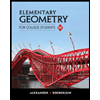2. Every angle can be trisected using a compass and marked straightedge. The following construction is due to Archimedes. Assume the compass has two marks on it, a distance r apart. Let ZBAC be an angle. Draw a circle y of radius r and center A. The circle will intersect both sides of the angle; in order to simplify the notation let us assume that B and C lie on the circle. Place the straightedge so that it passes through C and so that one mark is at a point D on y and the other is at a point E on `AB. (See Figure 9.17.) Use the Isosceles Triangle Theorem and the Euclidean Angle Sum Theorem to prove that u(2CEB) = (1/3)µ(LCAB). FIGURE 9.17: Archimedes' trisection using a marked straightedge
2. Every angle can be trisected using a compass and marked straightedge. The following construction is due to Archimedes. Assume the compass has two marks on it, a distance r apart. Let ZBAC be an angle. Draw a circle y of radius r and center A. The circle will intersect both sides of the angle; in order to simplify the notation let us assume that B and C lie on the circle. Place the straightedge so that it passes through C and so that one mark is at a point D on y and the other is at a point E on `AB. (See Figure 9.17.) Use the Isosceles Triangle Theorem and the Euclidean Angle Sum Theorem to prove that u(2CEB) = (1/3)µ(LCAB). FIGURE 9.17: Archimedes' trisection using a marked straightedge
Elementary Geometry For College Students, 7e
7th Edition
ISBN:9781337614085
Author:Alexander, Daniel C.; Koeberlein, Geralyn M.
Publisher:Alexander, Daniel C.; Koeberlein, Geralyn M.
ChapterP: Preliminary Concepts
SectionP.CT: Test
Problem 1CT
Related questions
Question
need correctly

Transcribed Image Text:2. Every angle can be trisected using a compass and marked straightedge. The following
construction is due to Archimedes. Assume the compass has two marks on it, a distance
r apart. Let ZBAC be an angle. Draw a circle y of radius r and center A. The circle will
intersect both sides of the angle; in order to simplify the notation let us assume that B
and C lie on the circle. Place the straightedge so that it passes through C and so that
one mark is at a point D on y and the other is at a point E on `AB. (See Figure 9.17.)
Use the Isosceles Triangle Theorem and the Euclidean Angle Sum Theorem to prove
that u(2CEB) = (1/3)µ(LCAB).
FIGURE 9.17: Archimedes' trisection using a marked straightedge
Expert Solution
This question has been solved!
Explore an expertly crafted, step-by-step solution for a thorough understanding of key concepts.
This is a popular solution!
Trending now
This is a popular solution!
Step by step
Solved in 3 steps with 3 images

Recommended textbooks for you

Elementary Geometry For College Students, 7e
Geometry
ISBN:
9781337614085
Author:
Alexander, Daniel C.; Koeberlein, Geralyn M.
Publisher:
Cengage,

Elementary Geometry for College Students
Geometry
ISBN:
9781285195698
Author:
Daniel C. Alexander, Geralyn M. Koeberlein
Publisher:
Cengage Learning

Elementary Geometry For College Students, 7e
Geometry
ISBN:
9781337614085
Author:
Alexander, Daniel C.; Koeberlein, Geralyn M.
Publisher:
Cengage,

Elementary Geometry for College Students
Geometry
ISBN:
9781285195698
Author:
Daniel C. Alexander, Geralyn M. Koeberlein
Publisher:
Cengage Learning